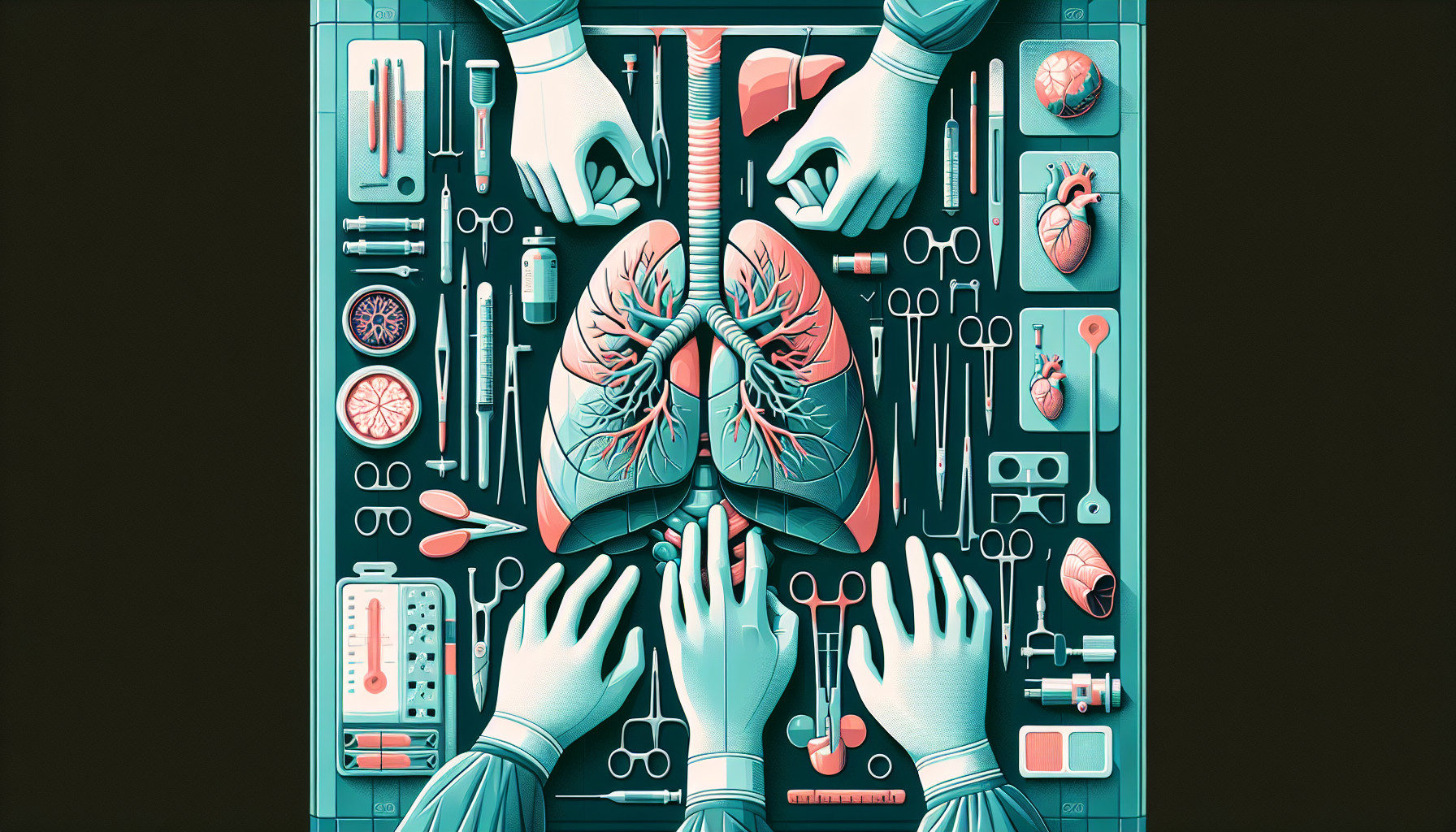Our Summary
This research paper discusses the treatment of lung cancer that has spread to the carina, a ridge located where the trachea splits into the two main bronchi. The treatment involves removal of the lung and the carina. The success of this complicated surgery depends on carefully choosing the right patients, using a combination of treatments, and having a team of specialists. The suitable patients are selected based on the stage of their cancer and their heart and lung health. The aim of the surgery is to completely remove the cancer and any affected lymph nodes. The joining of the tissues after removal must be done without any stress and supported with a flap of tissue that has a good blood supply. The paper also discusses various methods to ensure patients can breathe properly during the reconstruction of the carina.
FAQs
- What factors contribute to the success of a lung resection involving the carina?
- What criteria are used in the selection of patients for this type of lung resection?
- What are some of the methods used to maintain proper ventilation during the reconstruction of the carina?
Doctor’s Tip
A helpful tip a doctor might tell a patient about lung resection is to follow post-operative care instructions carefully, including taking prescribed medications, attending follow-up appointments, and participating in pulmonary rehabilitation if recommended. It is important to avoid smoking and exposure to secondhand smoke, as well as to maintain a healthy lifestyle to support optimal lung function and recovery. It is also important to report any new symptoms or concerns to your healthcare provider promptly.
Suitable For
Patients who are typically recommended for lung resection include those with early-stage lung cancer that has not spread to other parts of the body, as well as patients with localized tumors that are causing symptoms such as chest pain or difficulty breathing. Patients with certain types of benign lung tumors or infections may also be candidates for lung resection. Additionally, patients with advanced lung cancer who are not candidates for other treatments such as chemotherapy or radiation therapy may be recommended for lung resection as a palliative measure to improve symptoms and quality of life. Ultimately, the decision to recommend lung resection for a patient is based on a thorough evaluation of their overall health, the stage and location of their cancer, and their ability to tolerate surgery and recover successfully.
Timeline
Before lung resection:
- Patient is diagnosed with lung cancer and undergoes staging to determine the extent of the cancer.
- Patient undergoes evaluation of cardiopulmonary reserve to assess their ability to undergo surgery.
- Multimodality therapies such as chemotherapy or radiation may be used to shrink the tumor before surgery.
- Surgery is planned, including determining the type of resection needed (e.g. lobectomy, pneumonectomy).
- Patient undergoes pre-operative preparation and counseling.
After lung resection:
- Patient undergoes surgery to remove the affected part of the lung, including the carina if necessary.
- The surgeon ensures all of the malignancy and affected lymph nodes are removed.
- The anastomosis (reconnection of the airways) is performed, with care taken to make it tension-free and secure.
- Proper ventilation is maintained during the reconstruction of the carina, using various techniques.
- Patient undergoes post-operative care, including monitoring for complications such as infection, bleeding, or respiratory issues.
- Patient undergoes rehabilitation and follow-up care to monitor for recurrence and ensure optimal recovery.
What to Ask Your Doctor
- What is the purpose of a lung resection and how will it benefit my health?
- What are the risks and potential complications associated with a lung resection surgery?
- What is the success rate of lung resection surgeries for patients with my specific condition?
- How long is the recovery period after a lung resection surgery and what can I expect during the recovery process?
- Will I need any additional treatments or therapies after the lung resection surgery?
- How will my breathing and lung function be affected after the surgery?
- What is the likelihood of the cancer returning after a lung resection surgery?
- Are there any lifestyle changes or precautions I should take following the surgery to prevent complications?
- What is the experience and expertise of the surgical team performing the lung resection surgery?
- Are there any alternative treatment options to consider before proceeding with a lung resection surgery?
Reference
Authors: Mehran R, Deslauriers J. Journal: Thorac Surg Clin. 2018 Aug;28(3):315-322. doi: 10.1016/j.thorsurg.2018.04.004. PMID: 30054069
